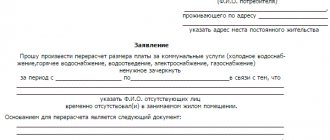Timely and full payment of utilities provided by housing and communal services is the responsibility of each apartment owner. Payment is made once a month according to the receipt for utility bills.
Most of the residents of apartment buildings understand that the stable work of suppliers of natural resources, a management company or another organization involved in maintaining the house depends on their commitment and responsibility in paying for utilities.
But, unfortunately, there are also irresponsible residents who try to get various benefits for life for free. They avoid paying, talking with representatives of the Management Company or Housing Office.
Because of their actions, the whole house suffers, sometimes even the Criminal Code scatters the debts of defaulters on their neighbors. Such actions are a violation of the law, but the management company must take some methods to collect debt from negligent tenants.
How to deal with utility defaulters legally, are their neighbors obliged to suffer for other people's debts? There are standard legal regulations regarding this issue; debtors, housing and communal services workers, and those who pay money for utilities regularly need to know about them.
Reasons for debt
ATTENTION! There are three types of reasons for the lack of payments for utilities - social, physical, and psychological reasons.
Unscrupulous people do not always become debtors. Sometimes debt can arise for objective reasons beyond the control of the homeowner.
- The most objective reason is physical. A resident of an apartment building may not pay utility bills due to the fact that he became seriously ill, was hospitalized, or lost his job. Before this, there may have been no utility debts, and such debtors are trying to quickly rectify the situation.
- Debt is common among low-income families.
- The biggest problems arise for housing and communal services organizations and utility service providers with those debtors who do not pay for utilities simply because they do not consider it their responsibility . Although they unconditionally enjoy all the amenities of their home.
Most often, irresponsible defaulters with average and high incomes arise, people with low incomes and pensioners try to take their responsibilities to the housing and communal services responsibly. They are also helped in this by benefits and subsidies from the state, to which they are entitled due to their low income.
If the salaries of adult family members and various social benefits do not cover the amount of utilities, a large debt on the receipt gradually accumulates. After all, a family cannot deny itself food and essential expenses. In such a situation, you need to seek financial support from the state, because there may be some benefits and subsidies for such homeowners.
If you have a monthly debt, you should find an opportunity to pay it and then pay it off on time. When even small amounts remain unpaid month after month, the debt only grows, and it will become increasingly difficult to repay it.
Can cold, hot water, electricity or other utilities be turned off for non-payment?
Thus, water or electricity can be turned off if the consumer has a debt in an amount exceeding the amount of 2 monthly payments for these types of housing and communal services resources. This rule is spelled out in paragraph 118 of section XI of the Decree of the Government of the Russian Federation dated May 6, 2011 No. 354.
Services that can be disabled
- The end of the heating season - when it begins, the supply of heating to houses stops, and the service falls into the closed category and is listed there until the onset of next autumn.
- Non-payment of housing and communal services for a long time - in relation to certain types of utility resources, the supplier has the right to suspend their supply to apartments (for example, electricity, water, etc.). In this case, the suspended service will also be classified as closed.
We recommend reading: Sale of Okved Forest 2020
Therefore, you need to understand the mechanism for calculating this penalty and its possible sizes. The penalty is calculated for each day of delay and is tied to the current refinancing rate (the rate at which the Central Bank lends to other banks)
. In addition, the percentage of penalties depends on the length of delay in payment:
Ways to solve the problem
Dealing with defaulters is a difficult matter, since there is no universal method of dealing with them. Even according to housing legislation, it is difficult to punish a person who deliberately does not pay for utilities; there are no specific laws.
When the Management Company or another organization serving the house tries to apply the law on defaulters and collect the debt, the debtor finds some opportunities to hide under the protection of the state.
Social protection authorities and the press are involved, which can present the defaulter as a victim of the criminal code. As a result, even if the court orders a given person to pay utility bills, this is done in a lenient manner. Sometimes a significant portion of the debt is even written off.
What are the main measures of influence on persistent defaulters used by housing and communal services organizations? All of them comply with the law, but not all have real force; the effect depends on the moral qualities of the person. Can be used to collect debt:
- warning in the form of a notification letter, a telephone call, or a personal visit by an employee of the management company;
- accrual of penalties on unpaid amounts;
- disconnecting utilities (plugs on gas or sewer pipes), cutting electrical cables;
- when previous measures have been in vain, legal proceedings begin;
- the next step is seizure of property;
- The final action is eviction from the property.
Sometimes a serious conversation with the debtor and an explanation of all the consequences of his negative actions is enough. In some cases, violators bring the matter to trial. Utility workers sometimes have to come up with other measures to get paid for the services they provide.
ATTENTION! None of the methods of collecting utility debt should violate housing legislation or the laws of the country as a whole.
“Blackouts” and blockages: how they fight debtors for utilities
As you know, citizens of the Russian Federation are the most careful payers for utility services, especially in comparison with various legal entities (especially those associated with the state). Moreover, the dependence is this: the more modest a citizen lives, the more disciplined he is. The most exemplary ones are pensioners, but millionaires, on the contrary, are often slobs.
Late fees
But citizens who owe utility bills are not always malicious defaulters. Most often, people forget about their responsibilities or are late due to travel and business trips. It happens that, say, the head of the family is responsible for payments, but he unexpectedly ends up in the hospital, and his relatives don’t even know how this is done. In short, there are many reasons. Therefore, for citizens who are late in payments, the punishment will not be the worst - penalties.
The accrual is regulated by Article 156 (Part 14) of the Housing Code. Usually you need to pay rent by the 10th. No penalties will be charged for the first month of delay. So those who are simply late are “forgiven.” Then, starting from 31 days to the 91st, penalties are charged in the amount of 1/300 of the Central Bank refinancing rate of the unpaid amount for each day of delay. That is, over the next two months the fines are small, the rate is normal. But for citizens who will not remember their payments within three months, a “commercial rate” is provided - 1/130 of the Central Bank refinancing rate. That is, starting from the 91st day, debts grow like a snowball.
The amounts, by the way, may end up being huge, amounting to hundreds of thousands of rubles. Example: some residents in an organized village, for reasons of principle, do not pay the management organization (MA) for the maintenance of the microdistrict, demanding that the tariff be disclosed. And people don’t sign the agreement. The MA does not disclose the tariff, but it calculates fines regularly; in a year and a half, the amount of “debts” reached 100-150-200 thousand rubles. They say there are debts of half a million.
Let's reveal a little secret: the golden (almost literally) dream of utility workers is to set us a commercial rate from the first day of delay. Legislators have so far managed to hold the line. Moreover, for “freeloaders”, in addition to penalties, steeper penalties are provided - suspension or disconnection of utilities: only according to the rules
So, no one has the right to turn off utilities to a consumer, solely because the “house managers” didn’t like you for some reason or even owed them a lot. The rules for the provision of public services (approved by government decree No. 354 of 05/06/2011) have a clearly defined algorithm.
What does the document say about this? Cold water and heat cannot be turned off under any circumstances, even to the most marginal “elements” that have turned the apartment into a homeless shelter.
Further, in order to “earn” a blackout, you must be in debt for at least two months. That is, when the amount of debt for disconnected (limited) utilities, explains Yuri Kochetkov, Chairman of the Association of Management Organizations “Burmistr”. The limit is calculated using a special formula: the consumption standard is multiplied by the tariff and by two more.
PRIME PARK Moscow, Northern District, Khoroshevsky district, Dynamo metro station, CSKA metro station, Petrovsky Park metro station, Airport metro station
Then, the expert says, “the consumer is notified of the possible introduction of a procedure for suspending (restricting) the provision of utility services. The most common method of notification is a registered letter sent through the Russian Post, but a message delivered personally to the debtor, sent via SMS, email and through the GIS Housing and Communal Services can also be used.”
If a resident is two months in debt, he should receive a notification that he is going to be disconnected within the time period specified in the notification. But debtors often do not receive notifications, notes Konstantin Krokhin, chairman of the Union of Housing Organizations of Moscow, chairman of the board of the Arcade House HOA. In practice, rarely does anyone notify debtors via SMS and phone calls; notifications are mostly sent to the mailbox. And the fact that boxes can be mixed up and notifications can get lost is of little concern to anyone. The service is turned back on after the debt is paid off. Yuri Kochetkov draws attention to the fact that you will have to pay for additional work associated with turning it off and on.
The most common “punishment” is a power outage, the most terrible is the shutdown (limitation) of water drainage, that is, sewerage. This is worth talking about in more detail.
Lever for knocking out money
“Switching off” sewerage is a recent invention in the housing and communal services sector; it began to be practiced in 2011, when an updated version of the rules for the provision of utility services appeared and from there the ban on restricting sewerage mysteriously disappeared. But companies have proliferated suspiciously quickly and offer their services to public utilities for blocking sewers - installing special gullet plugs.
It is clear that after such a procedure, most debtors come running with money. Our commentator Konstantin Krokhin, who also works with debtors on duty, initially welcomed its appearance, as he believed that an effective rule had finally appeared that would limit the supply of utilities to major officials,” says the expert. — It is almost impossible to collect debts from them. Once they tried to restrict one of the governors from entering a Moscow apartment, so the special forces scattered everyone. And such a rule would make it possible to legally influence the debtor without such conflicts.”
However, in practice, according to Konstantin Krokhin, all this has turned into mass arbitrariness of management organizations (MAs) close to local authorities. As an illustration, the expert told a real case with a residential building - a business-class high-rise in the west of Moscow. The population of residents includes non-poor people, businessmen, and senior executives. Just such a “thieves” company came into their house through a competition and promised to keep the tariff for the maintenance and servicing of the common property of the house at an attractive price of 25 rubles per sq. m. meter. After some time, this company initiated a meeting and set a tariff of 62 rubles, for which it introduced additional services - cleaning the stylobate, washing windows with climbers, etc. The results of the meeting were falsified. Residents appealed to various authorities (the housing inspectorate, the prosecutor's office), but lengthy checks yielded nothing. People filed a lawsuit, which also lasted a long time and eventually admitted that there were violations, but they were minor and could not influence the decision of the meeting. “It was in 2020, from that moment the arbitrariness began,” says Krokhin. — People are starting to vote with rubles, protesting against 62 video cameras, the cleaning of the stylobate, etc. But according to the housing code, payment is considered uniform. You can't cross out one service you don't like. And the residents turn into debtors. One fine day, the UO creates a service that turns off the sewer system. Then he puts a notification in the mailbox a month before the shutdown, then three days, and it doesn’t matter to them whether the person received this warning or not, whether he is at home or on a business trip. People again turn to the prosecutor's office and the housing inspectorate. The inspection takes six months, the answer comes after eight months (all this time people have had their sewerage turned off, they are forced to rent housing): “according to the management company, the owner was notified.” The notice is ostensibly an entry in the company's journal, although the notice must come via mail. The fundamental principle of our justice - the defendant must be notified - has been violated. Then people go to an appointment with the management organization, and there they say - pay another debt plus 20 thousand for our services for turning off and turning on.
May resort town Leninsky district, 9 km from MKAD
Therefore, I am against shutting off any public services. UO in 99% of cases is supported by the authorities, it is useless to fight them. And it’s not even a matter of corruption – it’s so profitable for them to work and collect money.”
Utility workers don’t care about unsanitary conditions and people’s rights
We can only hope that the legislation can be changed. Galina Khovanskaya, chairman of the State Duma Committee on Housing Policy and Housing and Communal Services, submitted to parliament a draft law prohibiting the “switching off” of sewerage.
As the deputy says, there are a lot of requests on this topic, and for the most part not even from the debtors themselves, whose water supply has been turned off, but from their neighbors. Because “waste” is discharged into the stairwell, into the garbage chute, and through the apartment window into the courtyard. Neighboring apartments are flooded, there are cases when a plug blocked someone else’s sewer pipes “by mistake,” and people were forced to somehow get out of the situation.
Judicial practice on “disconnection” is very diverse: in some cases consumers are accommodated, but in others they are not. Therefore, a clear ban is necessary. The bill proposes to include it in Article 155 of the Housing Code of the Russian Federation.
And today, public utilities blocking sewers violate, for example, the sanitary and epidemiological requirements approved by the Decree of the Chief State Sanitary Doctor of the Russian Federation of June 10, 2010 No. 64, when operating residential buildings and premises. This document is worth quoting:
- it is not allowed to carry out work that violates the living conditions of citizens in neighboring residential premises;
- pollution and flooding of residential premises is not allowed;
- it is required to take timely measures to eliminate malfunctions of engineering and other equipment located in residential premises (water supply, sewerage, ventilation, heating, waste disposal, elevator systems and others) that violate sanitary and hygienic living conditions;
— it is required to take measures aimed at preventing the occurrence and spread of infectious diseases.
Blockers” also violate, by the way, Article 55 of the Constitution of the Russian Federation, which states that our rights and freedoms can be limited, firstly, by federal law (and not by government decree) and, secondly, if this is necessary “in order to protect the foundations of the constitutional system, morality, health, rights and legitimate interests of other persons, to ensure the defense of the country and the security of the state.”
But some problems arose with Khovanskaya’s bill - it received a negative response from the government. “They believe that the absence of such a measure will affect payment discipline,” comments Galina Khovanskaya. “But the government’s negative review is not a death sentence; we will continue to carry it out.”
Court order: greetings from the bailiff
Another relatively new institution through which debts are collected is a court order. The 11th chapter of the Civil Procedure Code (CCP) is devoted to it, and this institution is also regulated by the law on enforcement proceedings (Federal Law No. 229). It has been used in the housing and communal services sector since 2020.
Novo-Nikolskoye New Moscow, Troitsky district, Naro-Fominsk district, Pervomaiskoye village, Kaluzhskoye, Kievskoye highway, 26 km from the Moscow Ring Road
The court order was introduced to optimize and simplify judicial proceedings; its feature is its immediate entry into force. “For the forced execution of a court order, the issuance of a writ of execution is not required, since a court order is both an executive document and is enforced in the manner established for the execution of court decisions,” explains Yuri Kochetkov.
A person often finds out that a court order has been issued against him by receiving an SMS from a bailiff about blocking money in his accounts. For many, this comes as a complete surprise. But first things first.
“According to the Civil Procedure Code, if the debt for housing and communal services is up to 500 thousand rubles and the owner is an individual, then the management authority is obliged to act through a court order. If the limit is exceeded or complicated by the special status of the debtor, then litigation is initiated,” explains Konstantin Krokhin.
In Moscow, there is electronic document flow between courts and bailiffs; everything happens automatically and instantly. Bailiffs have the right to block only the amount of debt specified in the court order. In a good way, they should check the person’s financial situation and study information about his accounts. Bailiffs do not have the right to touch some of the debtor’s income, but in practice this rule may not be observed, and the person can easily be left without money.
The arrest is lifted within a few days, while the bailiffs exchange documents with the banks. “To speed up the process of removing the arrest from the account, the debtor can personally contact the SSP, providing payment documents confirming payment of the debt in full,” advises Yuri Kochetkov.
The main problem with a court order is that a person simply does not have time to react to what is happening. The law allows the debtor to come to court, write an objection if he does not agree with the court’s decision, and this will be the basis for canceling the court order. For example, private lawyer Olga (name changed) managed to cancel the court order that the court issued to her at the request of the Administrative Office. The MA demanded payment from Olga for its services, but they did not conclude an agreement, since Olga did not agree with its terms. Nevertheless, the UO presented the “fish” of the agreement to the court. The court did not delve into the essence of the case and simply “stamped” the decision to collect the debt. Olga arrived in court on time and wrote an objection. They left her behind.
However, Olga managed to pull this off because she met the deadline: her mother found a notice in the mailbox at the address where Olga was registered, but had not lived for a long time, and called her daughter. But many debtors are late with objections because they do not receive notifications. In addition, Olga was helped by her legal education and years spent in courts as a lawyer.
Why don't people keep up? Konstantin Krokhin says: “The court sends a copy of the order to the post office, and the post office must put in the box a notice of the presence of a court registered letter (it has a short waiting period - 5 working days instead of the usual month for registered letters). A citizen, having received a notification, must go to the post office and receive an order against his personal signature. If this does not happen, the post office must return the order to the court with a comment as to why it was not served (the subscriber is absent, refused, unsuccessful attempt at delivery, etc.). If we are talking about a regular unserved summons, the court will resend it. But the court order is not sent again.”
Apartment complex "Pravda" Moscow, Northern District, Begovoy district, Belorusskaya metro station
The Supreme Court clarified that if a person at his place of residence (permanent registration) has not received a court order, then it is still considered served upon the expiration of his stay at the post office (5 working days or 7 calendar days). That is, what is important is not the actual circumstances of non-delivery, but the fact that the mail has passed, and you should have come for a court order within 5 working days, but you didn’t come (that means you didn’t want to, and that’s your problem). From this date, the countdown of 10 days begins, after which the court order comes into force and can be executed.
The expert believes that this approach of the Supreme Court violates the fundamental principle of mandatory notification to the defendant, because “every defendant must know what he is accused of” in order to have an effective defense.
And one more interesting addition. According to Konstantin Krokhin, he had to deal with the fact that postmen did not go anywhere, but simply made appropriate notes on the computer. The court does not respond to documents brought by a person indicating that he was not served with a court order. “The court goes to track the mail, and it says that the notice has been served. The person asks where is my signature, and they answer him - here is the mail tracking. That is, evidence is replaced by information from the department,” concludes Konstantin Krokhin.
Yuri Kochetkov points out that the law allows you to challenge a court order even after the end of the 10-day period, if there are good reasons for this. However, Konstantin Krokhin argues that in practice this is incredibly difficult to do, especially for an ordinary person who is not burdened with legal knowledge. Therefore, he believes that in housing and communal matters it is necessary to return the claim proceedings.
We won't let you go abroad
The Law on Enforcement Proceedings (Article 67) allows bailiffs to restrict debtors who do not want to pay even in court. This mainly concerns debtors to banks, but unpaid housing and communal services can complement this sad picture. The critical amount of unpaid debts is 30 thousand rubles; if you have more debts, then traveling abroad may be temporarily “blocked” until you pay off your debts.
Eviction from an apartment for debts
This is a completely extreme measure, and such cases are rare. The Housing Code (Article 90) allows the eviction of a tenant (not the owner) based on a court decision if he has not paid “rent” for more than six months. But only to another room, which the authorities must present to him. In Moscow, several debtors were actually moved into a hostel, and this happened a very long time ago - more than 10 years ago.
With the owner of the property, everything is much more complicated; it is almost impossible to evict him from the apartment for debts. If this is the only housing, it is protected by Article 446 of the Code of Civil Procedure. So debtor owners can only be fought with other methods, and there are plenty of them (see above).
Summary
Studying laws is not an attractive activity. You have to strain, break through the text, study unfamiliar terms, consult with lawyers. But this must be done, because our world is ruled by people who understand payments, taxes and other similar matters. If you want to talk to them as equals, study the legislation.
Rays Moscow, Western District, Solntsevo district, Solntsevo metro station, Rumyantsevo metro station, Yugo-Zapadnaya metro station, 4 km from the Moscow Ring Road
Utility shutdown
Such a measure as turning off water, electricity, gas and other benefits has a very effective effect on apartment residents.
No one wants to live in a cold and dark room where even the sewage system does not work. The law allows utilities to be disconnected for non-payers, but before doing so, notification of this measure must be given.
Notification is made no later than three days before disconnection. Problems for apartment owners arise both due to the lack of household amenities and due to the fact that many more connection issues need to be resolved later.
Court
Litigation, as a method of influence, can be used when the owner of the apartment does not pay the receipts for more than three months . The mechanism is triggered by submitting a claim to court.
Using this method, you can repay debts in no more than three years. Is it worth bringing the matter to such large expenses? After all, even if your financial situation does not allow you to pay utilities in a certain month, you can find a solution by contacting the housing and communal services organization.
IMPORTANT! The defaulter not only pays back the debt for utility bills by court decision, he also pays the penalty accrued on payments and legal costs.
Sometimes the court proceedings do not result in the debtor returning the amounts unpaid on the receipts. He can prove that he is insolvent due to illness and has delays in wages. In this case, he will be declared a defaulter, but the housing and communal services will ultimately receive nothing.
Legal ways to deal with a utility debtor
- Current – unpaid debts for one billing period. Occurs even if the payment period has not yet completed. Thus, by virtue of Article 155 of the Housing Code of the Russian Federation, monthly payments for services provided are required no later than the 10th day, and the invoice is issued for the expired calendar month. Thus, even in the case of timely payment of housing and services on the 10th, in the period from 01 to the moment the funds are received, the current debt will be recorded. Enforcement measures are not applied to citizens with current debt, because this provision does not violate the rights of the creditor.
- Overdue – unfulfilled obligations for which the deadline for payment has already expired. If the management company, partnership or other housing maintenance organization has not changed the payment date, then from the 11th day of the month following the settlement month, a delay occurs. From the moment the debt is formed, not preventive and stimulating measures are applied to the defaulter, but rather enforcement measures - late fees.
We recommend reading: Okof Administration Building 2020
Types of debt for which we work with debtors
Specifically, the obligation to pay for utility services provided by housing and communal services, housing cooperatives, HOAs and management companies is concentrated in Article 153 of the Housing Code of the Russian Federation. Failure to pay, resulting in an increase in debt, involves the service provider carrying out work in relation to the residents. Most often, already at the first stages of accumulation of unfulfilled obligations, penalties are charged, disconnection of all kinds of services, filing a claim with an explanation of the consequences of going to court, etc. It also happens that collectors are involved in the case.
The carelessness of residents can lead to the fact that management companies will legally distribute the arrears among conscientious citizens, explains Fursov, but the amount of the “additional payment for a neighbor” will depend on the total area of the residents’ apartment. This means that owners of large apartments will pay many times more than owners of one-room apartments. As practice shows, it is low-income citizens who are the most vigilant, because they have to monitor the expenditure of every penny they earn. They constantly receive complaints about the fact that wealthy citizens living in their house do not want to come into conflict with managers by paying any payment, even an inflated one.
The HOA also received the right to influence debtors, and in case of prolonged non-payment, to evict them, using the living space of those evicted in accordance with the general decision of the partnership (to rent or sell).
Should we pay for our neighbors?
We have to deal with different situations, including those when management companies force residents to take action against defaulters from their home,” says Anatoly Fursov, “the managers’ imagination is at work. For example, in one of the residential complexes in Moscow, the management company required residents to influence non-payers through social networks, reminding them that the time had come to make a payment. All this is on the verge of complying with the law. The management company should do the following: engage in pre-trial settlement of the issue, collect materials that will serve as the basis for applying to the judicial authorities. This is the only legal way for the management company. But due to lengthy legal proceedings, which also require material costs, they do not want to do this.
The current legislation does not contain a rule according to which the supplier has the right to turn off water only after a corresponding court decision has been made. Thus, the water utility has every right to implement this measure of influence on the defaulter without legal proceedings.
Eviction
Such a debt collection measure as eviction is used extremely rarely. The defaulter finds various reasons to explain the impossibility of eviction. This could be serious illness, the presence of children, etc.
But there are cases when the court decided on the need to evict a person to a hostel or the private sector.
Therefore, you should not be lenient about this measure. Even the preceding shutdown of utilities will cause a lot of trouble.
Having your own apartment or house means ensuring a good quality of life, decent conditions for recreation or work, you need to value your property. In addition, if eviction is impossible, the court may seize other property of the debtor - a car, household appliances, and other valuables that will be used to compensate for debts.
Ban on traveling abroad
One of the current measures to combat debtors is a ban on crossing state borders. Even if the defaulter receives a visa, he may be stopped at customs by customs officials. In order to move on, you will have to return the money to housing and communal services.
For modern people, such a measure is very effective; it can disrupt plans for vacation, work abroad, or doing business. Housing and communal services are forced to look for ways to deal with irresponsible persons in order to ensure the stability and quality of their work.








